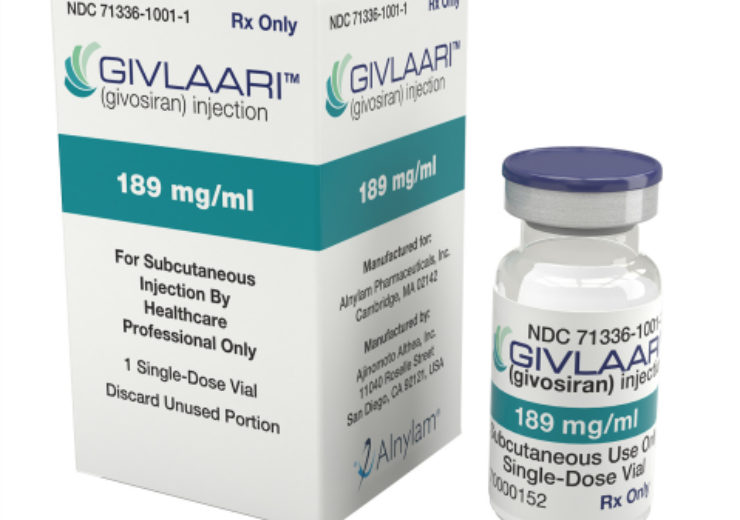GIVLAARI is an RNAi therapeutic designed to target aminolevulinic acid synthase 1 (ALAS1) for the treatment of adults with AHP

GIVLAARI (givosiran) packaging and product vial (Credit: Business Wire)
US-based RNAi therapeutics provider Alnylam has secured the US Food and Drug Administration (FDA) approval for its GIVLAARI (givosiran) as a subcutaneous injection for the treatment of acute hepatic porphyria (AHP) in adults.
AHP is a group of rare, genetic diseases characterised by potentially life-threatening attacks and chronic manifestations in some patients, impacting daily functioning and quality of life. Chronic neuropathic pain, hypertension, chronic kidney disease and liver disease are some of the long-term complications of AHP.
Alnylam chief executive officer John Maraganore said: “We believe the approval of GIVLAARI represents a landmark event for the advancement of precision genetic medicines, providing new hope for patients and their caregivers living with the debilitating manifestations of AHP and unpredictable nature of AHP attacks, as well as for the doctors who diagnose and treat these patients.
“We are grateful to the investigators, patients and families who have helped make this new treatment option a reality for the AHP community. We also commend the FDA for recognizing the immense medical need and granting this approval so quickly.”
ENVISION is the largest interventional study on AHP
Alnylam said that GIVLAARI is an RNAi therapeutic designed to target aminolevulinic acid synthase 1 (ALAS1) for the treatment of adults with AHP.
The drug is set to reduce the rate of porphyria attacks, which usually require hospitalisations, urgent healthcare visits or IV hemin administration at home.
The biopharmaceutical firm said that the FDA approval of GIVLAARI, in less than four months after NDA acceptance, is based on the positive results from the ENVISION clinical trial.
ENVISION is a Phase 3, a randomised, double-blind, placebo-controlled, multinational study conducted in 94 patients with AHP, at 36 study sites in 18 countries.
The study demonstrated that AHP patients treated with GIVLAARI experienced 70% fewer porphyria attacks compared to placebo, and the drug has also helped reducing urinary aminolevulinic acid (ALA), and urinary porphobilinogen (PBG), along with the use of intravenous hemin.
ENVISION study principal investigator Manisha Balwanii said: “Adults with AHP now have a new treatment option that has demonstrated the ability to reduce the frequency of porphyria attacks by specifically addressing factors associated with attacks and other disease manifestations of AHP.
“With the approval of GIVLAARI, and based on the efficacy data from the ENVISION study, I hope to see my patients and those across the country be able to live more normal lives with fewer porphyria attacks.”
